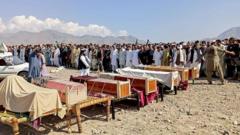In a tragic resurgence of violence, over 80 individuals have died due to sectarian clashes in the Kurram district of north-west Pakistan, as per official reports. The conflict erupted over three days, starting Thursday, following an attack on Shia Muslim convoys traveling under police protection, resulting in an initial toll of more than 40 fatalities, including women and children.
The brutal incidents have highlighted the deep-seated tensions between Shia and Sunni groups, which stem from decades of rivalry over various issues, including land disputes. According to a local administration official, the confirmed death toll now stands at 82, with 66 victims from the Shia community and 16 from the Sunni faction.
Eyewitness accounts, such as that of passenger Saeeda Bano, describe harrowing moments of the assault, as she concealed herself and her children beneath car seats, fearing for their lives. The violence has sparked a mass exodus of residents from the area, with many fleeing in search of safety amid the unrest that began on November 21 and extended into the weekend.
In reaction to the escalating violence, calls for a ceasefire have emerged from a local tribal council, and provincial officials have initiated discussions with leaders from both communities. However, the situation remains precarious, as evidenced by the recent incident where a negotiator’s helicopter came under gunfire upon arrival in the affected region.
The violence underscores the urgent need for dialogue and reconciliation efforts to address the underlying grievances fueling these sectarian clashes and the ongoing humanitarian crisis in the region.
The brutal incidents have highlighted the deep-seated tensions between Shia and Sunni groups, which stem from decades of rivalry over various issues, including land disputes. According to a local administration official, the confirmed death toll now stands at 82, with 66 victims from the Shia community and 16 from the Sunni faction.
Eyewitness accounts, such as that of passenger Saeeda Bano, describe harrowing moments of the assault, as she concealed herself and her children beneath car seats, fearing for their lives. The violence has sparked a mass exodus of residents from the area, with many fleeing in search of safety amid the unrest that began on November 21 and extended into the weekend.
In reaction to the escalating violence, calls for a ceasefire have emerged from a local tribal council, and provincial officials have initiated discussions with leaders from both communities. However, the situation remains precarious, as evidenced by the recent incident where a negotiator’s helicopter came under gunfire upon arrival in the affected region.
The violence underscores the urgent need for dialogue and reconciliation efforts to address the underlying grievances fueling these sectarian clashes and the ongoing humanitarian crisis in the region.






















